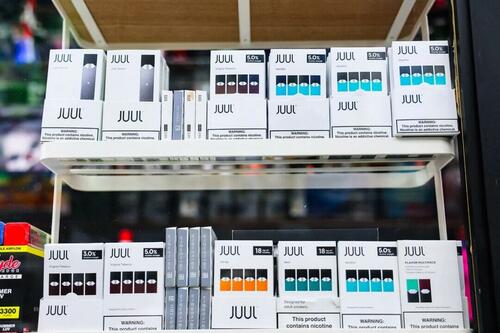
Authored by Marina Zhang via The Epoch Times,
The U.S. Food and Drug Administration (FDA) reversed its two-year ban on Juul’s e-cigarettes on Thursday.
The decision was made in response to new case law and the FDA’s review of the information Juul provided, the agency wrote in its public statement.
An FDA spokesperson told The Epoch Times that they could not expand on what case law the FDA is referring to.
The FDA’s initial ban on Juul e-cigarettes started on June 23, 2022, when the agency issued marketing denial orders (MDOs) to Juul Labs, banning all of the e-cigarette company’s products from the U.S. market.
The company immediately filed an appeal that placed a temporary stay on the ban. A week later, the FDA placed an administrative stay on the MDOs “after determining that certain scientific issues warranted additional review,” and Juul’s products remained on the market for two years.
With the new rescission, the FDA said its decision does not mean Juul’s products are now authorized for the U.S. market.
The rescission changes Juul’s application to pending status, and the FDA will conduct a review to authorize or deny Juul’s products.
“All e-cigarette products, including those made by Juul, are required by law to have FDA authorization to be legally marketed. The agency’s continued review does not constitute authorization to market, sell, or ship Juul products,” the FDA spokesperson told The Epoch Times.
The agency stated that its statutes will “significantly limit what the agency can disclose regarding the content of pending applications.”
In a statement published the same day, Juul welcomed the FDA’s decision.
“We appreciate the FDA’s decision and now look forward to re-engaging with the agency on a science- and evidence-based process to pursue a marketing authorization for JUUL products,” said the company.
“We remain confident … and believe that a full review of the science and evidence will demonstrate that our products meet the statutory standard of being appropriate for the protection of public health.”
Juul’s devices and tobacco- and menthol-flavored e-cigarette pods will remain on the market during the review.
Juul’s Past Ban and Controversy
Juul is currently the No. 2 e-cigarette company in the United States.
The company was launched in 2015 and quickly gained popularity among teenagers and young adults. It then caught the attention of lawmakers and regulators due to concerns that Juul intentionally targeted younger people.
Beginning in 2017, the popularity of e-cigarettes in the United States increased by 40 percent, driven primarily by Juul.
At the peak of its popularity in 2019, the company represented the e-cigarette craze, commanding 75 percent of the market share in the United States.
Beginning in 2019, health agencies issued alerts about teenagers ending up in emergency departments due to respiratory injuries from vaping. States and affected families filed personal injury lawsuits against Juul, alleging inappropriate marketing to youths.
In 2020, under a federal court order, the FDA began requiring all e-cigarette and vaping companies to submit applications to continue marketing their products.
In June 2022, the FDA ordered that Juul products be taken off the market due to four unresolved questions in its toxicology data. In its appeal to the FDA, Juul told the agency that these questions could have been clarified through the usual procedures or “a mere phone call.”
Though the ban only lasted a few days, the amassed litigation and FDA action soon sent the company into a financial crisis, with it narrowly avoiding bankruptcy in 2022 and 2024.
Juul has since taken steps to reduce underage usage by not featuring anyone younger than 35 in commercials and requiring age verification for purchase from its website.
Since 2023, Juul’s underage usage has been cut by 95 percent. In December 2023, the company submitted applications to the FDA for next-generation e-cigarette products, but these have not yet been approved.
Authored by Marina Zhang via The Epoch Times,
The U.S. Food and Drug Administration (FDA) reversed its two-year ban on Juul’s e-cigarettes on Thursday.
The decision was made in response to new case law and the FDA’s review of the information Juul provided, the agency wrote in its public statement.
An FDA spokesperson told The Epoch Times that they could not expand on what case law the FDA is referring to.
The FDA’s initial ban on Juul e-cigarettes started on June 23, 2022, when the agency issued marketing denial orders (MDOs) to Juul Labs, banning all of the e-cigarette company’s products from the U.S. market.
The company immediately filed an appeal that placed a temporary stay on the ban. A week later, the FDA placed an administrative stay on the MDOs “after determining that certain scientific issues warranted additional review,” and Juul’s products remained on the market for two years.
With the new rescission, the FDA said its decision does not mean Juul’s products are now authorized for the U.S. market.
The rescission changes Juul’s application to pending status, and the FDA will conduct a review to authorize or deny Juul’s products.
“All e-cigarette products, including those made by Juul, are required by law to have FDA authorization to be legally marketed. The agency’s continued review does not constitute authorization to market, sell, or ship Juul products,” the FDA spokesperson told The Epoch Times.
The agency stated that its statutes will “significantly limit what the agency can disclose regarding the content of pending applications.”
In a statement published the same day, Juul welcomed the FDA’s decision.
“We appreciate the FDA’s decision and now look forward to re-engaging with the agency on a science- and evidence-based process to pursue a marketing authorization for JUUL products,” said the company.
“We remain confident … and believe that a full review of the science and evidence will demonstrate that our products meet the statutory standard of being appropriate for the protection of public health.”
Juul’s devices and tobacco- and menthol-flavored e-cigarette pods will remain on the market during the review.
Juul’s Past Ban and Controversy
Juul is currently the No. 2 e-cigarette company in the United States.
The company was launched in 2015 and quickly gained popularity among teenagers and young adults. It then caught the attention of lawmakers and regulators due to concerns that Juul intentionally targeted younger people.
Beginning in 2017, the popularity of e-cigarettes in the United States increased by 40 percent, driven primarily by Juul.
At the peak of its popularity in 2019, the company represented the e-cigarette craze, commanding 75 percent of the market share in the United States.
Beginning in 2019, health agencies issued alerts about teenagers ending up in emergency departments due to respiratory injuries from vaping. States and affected families filed personal injury lawsuits against Juul, alleging inappropriate marketing to youths.
In 2020, under a federal court order, the FDA began requiring all e-cigarette and vaping companies to submit applications to continue marketing their products.
In June 2022, the FDA ordered that Juul products be taken off the market due to four unresolved questions in its toxicology data. In its appeal to the FDA, Juul told the agency that these questions could have been clarified through the usual procedures or “a mere phone call.”
Though the ban only lasted a few days, the amassed litigation and FDA action soon sent the company into a financial crisis, with it narrowly avoiding bankruptcy in 2022 and 2024.
Juul has since taken steps to reduce underage usage by not featuring anyone younger than 35 in commercials and requiring age verification for purchase from its website.
Since 2023, Juul’s underage usage has been cut by 95 percent. In December 2023, the company submitted applications to the FDA for next-generation e-cigarette products, but these have not yet been approved.
Loading…






